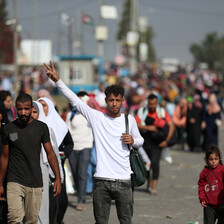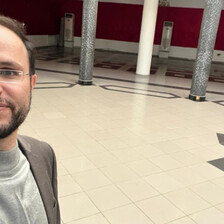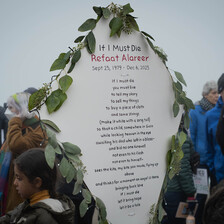The Electronic Intifada 5 December 2024
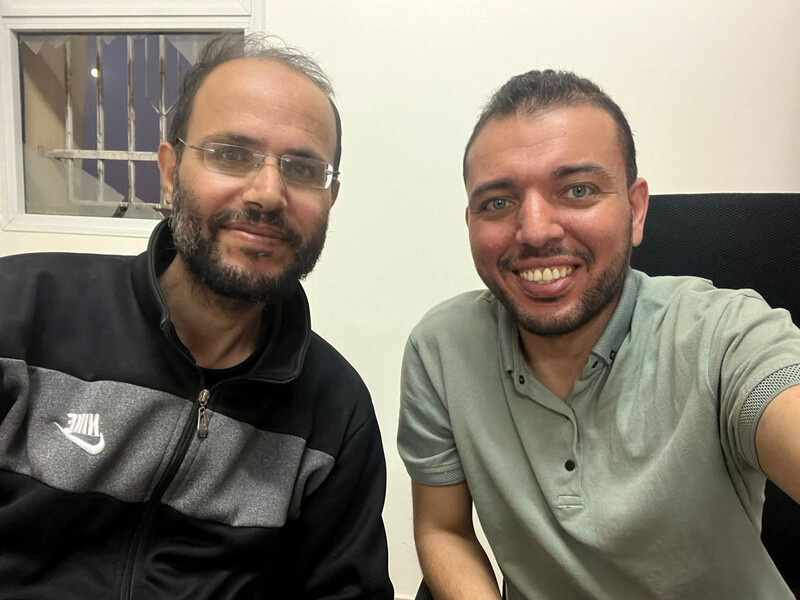
The author (right) with Refaat Alareer at the Gaza Municipality offices during a temporary ceasefire on 23 November 2023.
At 3:15 pm precisely one year ago, on 6 December 2023, I received a call from Refaat. It was during the most intensive strikes of the war and the ground invasion of Gaza City. On the other end of the line was Refaat’s voice, full of energy as usual.
“Where are you? I’m here at the garage,” he said, referring to the emergency operations center of the Gaza Municipality, where I work, located at the heavy machinery depot. Although our meeting had become a daily routine, it was always a delight.
After nearly 25 years, I had grown accustomed to Refaat’s sudden calls, spontaneous plans and impromptu adventures. That was his nature – calling early in the morning to suggest breakfast at Al-Khazendar, a local hummus and falafel restaurant, picking figs and grapes in the orchards of Sheikh Ijleen south of Gaza City, or planning an afternoon outing to the borderlands. But this call was different. It would be our last one.
A sadness lingers in my heart knowing that I was the last known living person to see Refaat alive and to share his final hours that day. We parted moments before he was targeted and killed alongside six other members of his family.
Long walk to the internet
Our journey that day began in the garage, where we searched for an internet connection. At that time, with Israel having imposed a communications blackout in Gaza, the only way to connect was to find a suitable location to catch an eSIM signal, ideally at elevation in a high rise, though those were and remain utterly dangerous due to Israeli targeting. Refaat jokingly called it the “long walk to the internet,” alluding to Nelson Mandela’s autobiography Long Walk to Freedom.
We started from al-Wihda Street, near the public library, and walked west towards al-Amal Institute for Orphans to check on some of his family members sheltering there. Along the way, Refaat climbed a tree to try to catch an internet signal, jotted down an idea, took a photo, played with a child, fed a cat and assisted an elderly man with some cash.
In fleeting moments and brief encounters like these, Refaat made an impression wherever he went.
We couldn’t reach al-Amal Institute because an Israeli sniper was stationed on a building near Palestine Mosque Square overlooking al-Wihda Street, Omar al-Mukhtar Street and the surrounding areas.
With the sniper targeting anything that moved, we were forced to turn back.
We took a detour east amidst the sound of gunfire and walked through al-Shuhada Street near al-Saraya – a landmark in Gaza that was once a prison and then became a park that everyone used to pass by or visit every day. Eventually, we reached Mustafa Hafez school in al-Rimal neighborhood, where the rest of Refaat’s family had sought refuge. Refaat checked on his wife and children at the school, ensuring they were safe.
We then worked through a maze of alleys and reached Yarmouk Stadium in the city center by sunset. Tanks were only about two kilometers away. We sat for a while at the stadium. Families newly displaced from their homes were sitting there, unsure of where to go, while their oblivious children played soccer – their game accompanied by the roar of fighter jets and intermittent explosions rather than cheering crowds.
Unbeknownst to us at the time, the stadium would in a few days be converted into a mass detention facility. Refaat took photos while repeating, “Such resilient people … such resilient people. Wallahi, those are such resilient people.”
Refaat spent the final weeks of his life displaced from his home, which was bombed in October, moving from one shelter to another after occupation forces invaded the Tal al-Hawa neighborhood where he lived. He endured great hardship juggling his family responsibilities with his commitment to telling the world what was happening in Gaza.
He didn’t even know where he would sleep that night on what would be his last day. Eventually, he decided to check on his sister, who was also displaced, and spend the night where she was staying. Little did he know that it would be his final night and this his final displacement.
Refaat’s ideas for the future
At Yarmouk Stadium, we sat on the grass, which was greyish-green from all the soot in the air. Refaat spoke about his dream of dedicating himself entirely to storytelling.
“If I survive this war, I will collaborate with my talented students to collect stories, turn them into books and novels and eventually produce short and feature-length films based on them,” Refaat said in what was more of a monologue than a conversation between us.
Ever practical, he had drafted some ideas for these films on his phone – some of which he shared with me. They were remarkable. Refaat frequently spoke fondly of his students, and they appreciated that. Despite the shell of toughness that he assumed as a teacher, his students knew he loved and cared for them deeply, much like a father cares for his children.
“I have two talents in life: one is shutting out of the classroom those who are late; and the other is bringing the best out of those inside,” he once bragged, jokingly – albeit it really wasn’t a joke.
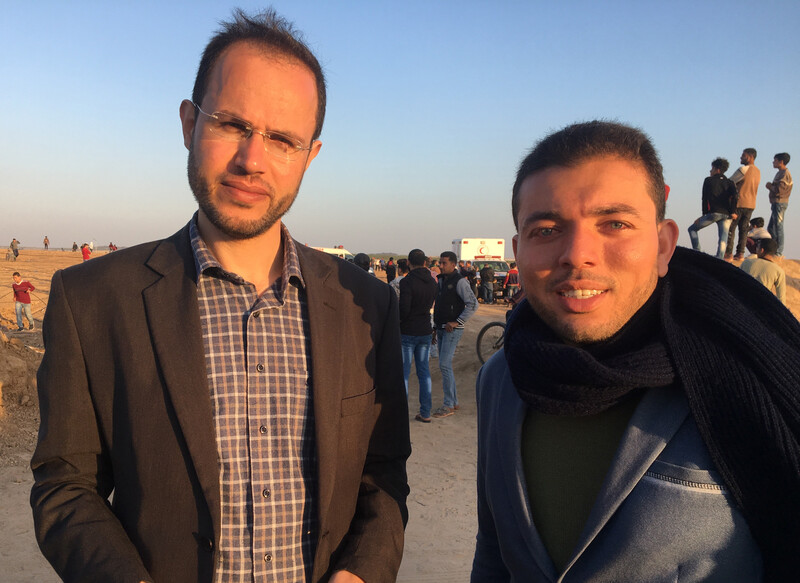
Refaat Alareer and the author on 30 March 2018, the first day of Gaza’s Great March of Return protests, shortly after inhaling tear gas fired by Israeli troops.
A few days after the war began, Refaat contacted me and came to Gaza Municipality to volunteer in the media team. In the short time that he worked with us, he managed the municipality’s account on X; translated multiple statements into English; helped shed some light on the people’s suffering due to water shortages and a lack of essential services in the early days of the war; documented the conditions at the Gaza Zoo – where the majority of animals died from starvation; and helped get an opinion piece by the mayor of Gaza City published by The New York Times.
During the war, I saw Refaat help countless people: students, friends, colleagues and even strangers. His generosity and selflessness led him to offer help without waiting for someone to ask.
On one occasion, a few days before his murder, he came across one of his students on the street. After a brief conversation, he gave her money, insisting that she take it despite her refusal. Watching from afar, it was clear he was trying to assist her. He later told me the money was for a previous task she had done – though it seemed to me that the story was a modest cover to hide his generous gesture.
Vulnerability
We walked east as we left the stadium, turning onto a street lined with tall trees.
Refaat spoke words I had never heard him say before: “I’m tired. I’m exhausted from running, from displacement and from carrying heavy water.”
It was strange to see the vulnerable Refaat. He had always been strong, fearless and unwavering. His last day felt like an entire lifetime packed into a few hours. He began it by carrying water upstairs; then he wrote an article and checked on his family. He ended it by spending time with a lucky friend.
I am proud and grateful to have crossed paths with Refaat, first as his student, then as his friend, partner in various projects, colleague, close collaborator and – finally – as intimate as family. That pride is now accompanied by a deep loneliness.
In spite of this loneliness, I hold a profound conviction that rare and deeply impactful connections like the one we shared only grow stronger and deeper in grief, continuing to flourish even after a person’s passing. My faith gives me solace, knowing Refaat’s sacrifice was not in vain. His death was neither meaningless nor forgotten. His passing has transformed that life into a belief in itself, a testament to the enduring power of his life and legacy.
In his passing, Refaat fulfilled his lifelong goal of raising awareness about Palestine. He became a story himself, a symbol of freedom and an icon cherished not only by his friends and those who knew him, but also by countless supporters of the Palestinian cause worldwide.
Perhaps I was not fortunate to be the last person to see Refaat before his death, as this fact alone leaves my heart with an eternal ache. But sorrow will not stop me or Refaat’s friends and students from moving forward with carrying on his legacy. Our grief is fuel for achieving our hopes and Refaat’s dream of justice for Palestine.
Refaat and I had planned to meet again the next day at the same time and place. As always, both before and during the war, our goodbye was marked by a warm, long hug and three kisses, two on the right cheek, and one on the left.
Though sweet at the time, that loving parting will forever live as a painful one in my memory, as it was our final embrace.
To my beloved brother Refaat, until we meet again.
Photos courtesy of the author.
Asem Alnabih is an engineer and PhD researcher currently based in north Gaza. He serves as the spokesperson for the Gaza Municipality and has written for many platforms in both Arabic and English.


